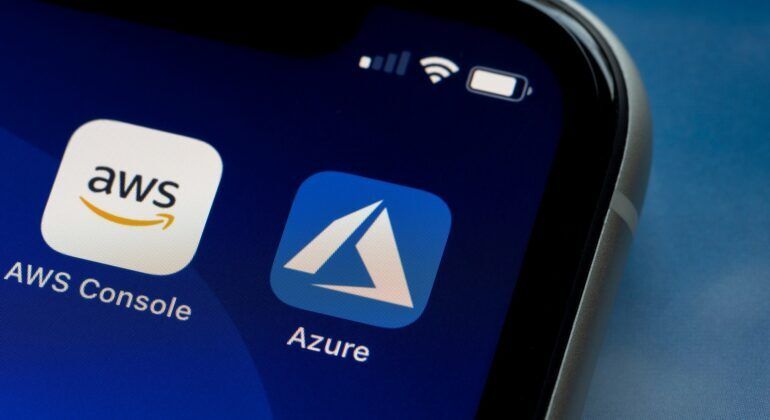What's The Difference Between AWS Vs Azure Vs GCP – The Cloud Platform of Your Choice?

Cloud computing has revolutionized the way companies work and progress us to a new technological era. Amazon Web Services(AWS) , Microsoft Azure , and Google Cloud Platform(GCP) are the top cloud service providers that conquer the worldwide cloud market.
Virtually all enterprise companies are moving towards the cloud and even multi-cloud environments to take advantage of the benefits provided by cloud computing, such as decreased CapEx, reduced infrastructure maintenance, increased availability, and Scalability.
AWS, Azure, and GCP possess the experience and knowledge to provide a dependable and feature-rich cloud platform. However, before committing to a specific cloud platform, you must do your due diligence and thoroughly compare each platform to fully understand its capabilities and differences. Let’s deep dive to understand which among these three cloud platforms is suitable for your business.
What is Amazon Web Services (AWS)?
Amazon Web Services is the current market leader in cloud computing platforms and is a subsidiary of Amazon, Inc.
It is the most mature cloud platform delivering a wide range of services to everyone, including individual developers, large enterprises, and governments.
AWS has actually started as an internal cloud offering. By 2006, it had grown into a publicly available cloud platform with services like Amazon S3 cloud storage and elastic compute cloud (EC2). AWS now offers more than 200 fully-featured services to meet demand and serve millions of users. Below are the notable AWS customers:
- Airbnb
- Coca Cola
- Coinbase
- Coursera
- Expedia
- Food and Drug Administration (FDA)
- Formula 1
- Intuit
- Lyft
- Netflix
What is Microsoft Azure?
Microsoft Azure is the second-largest cloud platform after AWS. Azure has developed into a cloud platform with over 200 products and services after debuting in 2010. Today, it is one of the fastest-growing cloud platforms.
As Microsoft offers Azure, it offers a wide range of services tailored specifically for Microsoft-centric enterprises by making switching to a cloud or a hybrid-cloud environment smooth for many organizations. More than 95% of the top 500 companies in the USA use Microsoft Azure. It has a proven track record in catering to enterprise users.
Azure is not limited to Windows-based services as it also supports open-source languages, technologies, and platforms, giving anyone the liberty to build and support any application. Below are the notable Azure customers:
- 3M
- Asos
- Center of Disease Control (CDC) – US
- DAIMLER AG
- HSBC
- HP
- McKesson Group
- Mitsubishi Electric
- National Health Service (NHS) – UK
- Renault
- Starbucks
- Walgreens
What is Google Cloud Platform (GCP)?
The Google Cloud Platform is the cloud offered by none other than Alphabet Inc. GCP is part of the overarching Google Cloud and has been available to the general public since 2010. The Google Cloud Platform now offers over 100 services spanning computing networking, big data, etc. Today, GCP comprises services including Google Workspace, Chrome OS, and enterprise Android.
GCP is the smallest of the three cloud providers compared to AWS and Azure. However, it offers a rich set of cloud services to power and supports any application. Below are the notable GCP customers:
- Nintendo
- Paypal
- Spotify
- The Home Depot
- Target
- Toyota
- Unilever
- UPS
AWS vs Google Cloud Price Comparison
Choosing the right cloud service provider is an important decision for businesses. When comparing AWS and Google Cloud, cost considerations become important. AWS typically offers more flexible pricing on a pay-as-you-go model, while Google Cloud's pricing model is easier to understand, potentially resulting in cost savings Both providers have unique capabilities, so choosing one depends on your specific needs.
Why did you choose Google Cloud
Google Cloud boasts a robust infrastructure with state-of-the-art technology. Its strong suit is data analytics, machine learning and AI capabilities. If your business relies heavily on data-driven insights, Google Cloud’s services, such as BigQuery and TensorFlow, can give you a competitive edge. Its simplified pricing structure and strong commitment to sustainability make it attractive to environmentally conscious businesses.
Why choose AWS
AWS is a market leader with a diverse collection of services, global reach and comprehensive customer support. For scalability and a broad service portfolio, it’s hard to beat AWS. If your organization needs a complete cloud solution, AWS is a solid choice. Its long tenure in the business and constant innovation ensures reliable and up-to-date cloud services.
How to choose a right cloud service provider
There are many aspects to consider when choosing a cloud service provider. Let’s look at the most common factors.
1. Regions and availability
When selecting a cloud provider, the first thing to consider is its supported regions and availability. These factors directly influence the performance of your cloud due to latency and compliance requirements, mainly when dealing with data. As of 2021, here’s where they stand:
- Amazon Web Service: It has around 25 geographic regions with 81 availability zones. It also has 218+ edge locations and 12 Regional Edge Caches.
- Microsoft Azure: It operates in 60+ regions with a minimum of three availability zones in each region with more than 116 edge locations.
- Google Cloud Platform: It has 27 cloud regions with 82 zones and 146 edge locations.
These platforms deliver specialized cloud solutions for the government. Also, both AWS and Azure provide specialized services that cater to the Chinese market with data centers located in China.
Azure has the most comprehensive geographic coverage compared to the other two platforms and shows no signs of slowing. All providers constantly expand their coverage by adding more regions and zones to fulfill the ever-increasing computing demand.
2. Pricing
The pricing of the cloud platform relies on many factors, such as customer requirements, usage, and the services used. All three platforms have competitive pricing plans with extra cost management options like reserved instances, budgets, and resource optimization.
As per the consensus in the IT community, Microsoft Azure has less on-demand pricing, and Amazon tends to come somewhere around the middle. Nevertheless, there is an obvious advantage when enterprise customers already using Microsoft services move to Azure as it is incredibly cheaper than other cloud providers.
Common services
AWS and Azure have the most extensive service catalogs, offering more than 200+ services. GCP currently offers around 100+ services. A general breakdown of services is:
1. AWS has the most extensive catalog of services.
2. Azure is a close second with impressive Artificial Intelligence, Machine Learning, and analytics services.
3. GCP comes in third place for the number of services offered.
Conclusion
Microsoft and Google are rapidly growing to compete with AWS, the present market leader in capacity and service.
Microsoft is competing strongly with AWS with its strong focus on the enterprise. Meanwhile, Google persists in evolving its presence by delivering excellent integrations with open-source projects and third-party services.
In the end, it all boils down to your particular use case. As the market grows, most companies are looking for multi-cloud techniques to leverage the benefits offered by each cloud provider without committing themselves to a single provider.
Still uncertain about which cloud suits you best? We are here to solve your puzzle. Oamii Technologies , a leading cloud solutions provider, has designed, deployed, and maintained countless cloud applications. Get in touch with us and harness our cloud expertise. Walk away with a solution tailored just for you.
Disclaimer: The information on this website and blog is for general informational purposes only and is not professional advice. We make no guarantees of accuracy or completeness. We disclaim all liability for errors, omissions, or reliance on this content. Always consult a qualified professional for specific guidance.






